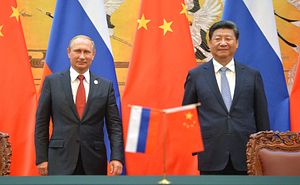No appeasement. No accommodation. On July 12, the Permanent Court of Arbitration in The Hague smashed China’s expansive nine-dash line claim in the South China Sea, as well as its conduct with regards to the environment and Philippine fishermen, as inconsistent with the Constitution of the Oceans – the 1982 UN Convention on the Law of the Sea (UNCLOS). Beijing is now in damage control mode – disregarding the court’s jurisdiction, denying any compliance with the merits and making a list of international reactions.
On the long list of countries Beijing claims to have support from, Russia is the largest and most influential state. Moscow’s reaction to the court ruling was somewhat delayed and was voiced on July 14. It also came in the form of an answer to a question posed by a Chinese journalist at the weekly press briefing by the foreign ministry’s spokeswoman Maria Zakharova – a clear sign that Russia wishes to distance itself from the disputes and does not regard the South China Sea as a first tier issue.
As usual with the Russian stance, Moscow expressed support for a diplomatic solution to the dispute by the parties involved, called for compliance with international law, including UNCLOS and the 2002 Declaration of Conduct, and an early conclusion of a binding Code of Conduct.
But there was something else. The Russian MFA spokeswoman explicitly said that Russia does not take sides in the conflict. Though making the case against extra-regional involvement, she did not mention non-claimants that are using the situation for their own geopolitical considerations, the usual euphemism for the United States. Finally, she mentioned UNCLOS not once but twice, supporting the Convention’s role in upholding rule of law in the oceans and stressing the universal nature of the document.
These minor additions made the fresh Russian statement go a little bit beyond the baseline. Emotionally, it looked like a snap of the teeth toward extensive pressure. And pressure there has been. There is no doubt that Beijing has utilized bilateral channels to push Russia toward more support. Just one day before the ruling was announced, the deputy chief of China’s diplomatic mission to Russia visited the Foreign Ministry to discuss “current bilateral and global issues.” Zakharova said that Russia will not be drawn into the disputes and it is rather clear who has been most industrious in trying to do so.
Previously, China has been very liberal with Russia’s position, bending the non-internationalization clause as proof of Russian support. If we take the clause at face value, then it makes perfect sense, as Moscow has been historically against any interventions by extra-regional states into its own neighborhood and other neighborhoods by extension. However, when put into context it sounds too much in harmony with China’s opposition to the internationalization of the South China Sea disputes, by which Beijing means mainly two things – U.S. involvement and international arbitration.
Beijing, as it has done previously, will still count Russia on the list of states that support China in its defiance of any arbitration and this week’s PCA ruling in particular. Moscow is unlikely to make clarifications, let alone take back words or make excuses, to avoid irritating its strategic partner. This means that in this rapidly changing environment, Russia’s big diplomatic success will consist in standing ground and withholding pressure from both sides — even if this neutrality is taken as a lack of support.
Anton Tsvetov is a Southeast Asia researcher with the Russian International Affairs Council (RIAC), a Moscow-based foreign policy think tank. He tweets on Asian affairs and Russian foreign policy at @antsvetov. The views expressed here are the author’s own and do not reflect those of RIAC.

































